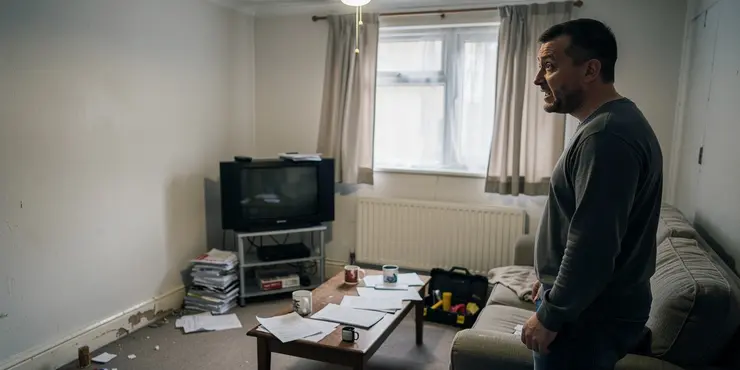
Find Help
More Items From Ergsy search
-

How are rent increases regulated under the new law?
Relevance: 100%
-

What are the new Tenancy Law Reforms in the UK in 2025?
Relevance: 52%
-

How does the reform impact renting costs?
Relevance: 41%
-

What alternative solutions are being discussed to combat rising rents?
Relevance: 41%
-

What new protections are included for tenants?
Relevance: 38%
-

How does inflation affect the situation with housing benefits and rents?
Relevance: 36%
-

Understanding the New Domestic Abuse Laws in the UK
Relevance: 36%
-

Can I stop an eviction if I catch up on rent payments?
Relevance: 35%
-

Can mobility equipment be rented?
Relevance: 34%
-

Who can be considered a domestic abuse perpetrator under the new law?
Relevance: 33%
-

What is the relationship between rising rents and housing benefit cuts?
Relevance: 32%
-

What changes affect pet policies in rented homes?
Relevance: 31%
-

Is there assistance available for rent or mortgage payments?
Relevance: 30%
-

What are the proposed Cuts to Housing Benefits Amid Rising Rents?
Relevance: 30%
-

Is the production of ketamine regulated?
Relevance: 30%
-

Navigating Post-Brexit Family Law Changes
Relevance: 28%
-

What role do local councils play under the new law?
Relevance: 28%
-
Are there any changes to surrogacy arrangements under the 2026 family court law?
Relevance: 27%
-
Are there any changes to spousal support regulations in 2026?
Relevance: 27%
-

How can I calculate my new earnings based on the National Living Wage increase?
Relevance: 27%
-

Are there specific regulations for ground burials in the UK?
Relevance: 27%
-

Landlord Licensing Laws Under Review as Tenants Call for Stronger Protections
Relevance: 27%
-

Legal Experts Warn of Consequences in Upcoming AI Regulation Bill
Relevance: 26%
-

New Government Benefits for Low-Income Families
Relevance: 26%
-

What role does government regulation play in protecting pensions?
Relevance: 26%
-

Are there specific laws against dangerous driving?
Relevance: 25%
-
How have child custody laws changed in 2026?
Relevance: 25%
-
What are the changes to Family Court Law in 2026?
Relevance: 25%
-

Are nicotine pouches regulated by health authorities?
Relevance: 25%
-

New Study Links Diet Soda to Increased Risk of Heart Disease
Relevance: 25%
-

Supreme Court to Hear Landmark Case on Environmental Regulations
Relevance: 25%
-

Impacts of Recent Changes to Family Law Legislation
Relevance: 25%
-

Do existing UK laws sufficiently protect under 16s on social media?
Relevance: 24%
-

What agencies monitor and regulate sewage pollution in the UK?
Relevance: 24%
-
Are there any new requirements for divorce filings in 2026?
Relevance: 23%
-

Watchdog Raises Concerns Over Commercial Landlord Regulations
Relevance: 23%
-
Are energy prices regulated in the UK?
Relevance: 23%
-

How is cortisol regulated in the body?
Relevance: 23%
-

Who regulates the performance and compliance of UK water companies?
Relevance: 23%
-

Controversy Surrounds New Surveillance Legislation as Privacy Groups Voice Concerns
Relevance: 23%
Introduction to Rent Increases
Rent increases can be a significant concern for tenants and landlords alike. With the introduction of new regulations, there is a necessity to understand how these changes impact both parties in the UK. Rent regulations aim to ensure fairness and transparency, protecting tenants from excessive rent hikes while providing landlords with a valid framework for raising rents when necessary.
Recent Changes to Rent Regulation
The recent regulatory changes have been implemented to address the rising cost of living and ensure housing remains affordable. These new laws are part of broader housing reforms intended to stabilize the rental market. The government has recognized the need to intervene in the rental market to protect vulnerable tenants from disproportionate rent increases that could lead to financial difficulties and potential homelessness.
Limits on Rent Increases
Under the new law, there are specific limits on how much landlords can increase rent within a particular timeframe. Generally, rent hikes are now restricted to once per year. The allowed increase is tied to local market rates and inflation indicators, creating a balance that prevents landlords from imposing unreasonable and sudden rent hikes. In some areas classified as rent pressure zones, caps are stricter to curb excessively high rents.
Notice Requirements
Landlords are required by law to provide advance notice before increasing rents. Typically, a minimum notice period of one rent period or six months, whichever is longer, is mandated. This notice must be given in writing, including clear reasons and justifications for the increase, ensuring transparency for the tenant. This allows tenants sufficient time to plan accordingly, whether it's to budget for the increased rent or explore other housing options.
Dispute Resolution
Tenants who believe a proposed rent increase is unfair have the option to dispute it. A Rent Assessment Committee, or a similar tribunal, offers a formal way to challenge and negotiate unreasonable rent hikes. This body examines rent increase disputes, providing a resolution mechanism that considers both tenant and landlord perspectives. Their decisions are binding, preventing either party from imposing conditions unilaterally after the decision is made.
Conclusion
New laws regulating rent increases in the UK are vital in protecting tenants while allowing landlords to adjust rents in line with market trends. These measures ensure that any increase is not only fair but also justified and consistent with overall housing policy goals. Both tenants and landlords should stay informed about these laws to understand their rights and responsibilities under the new regulatory framework. Remaining informed helps in maintaining a balanced, fair, and equitable rental market.
What You Need to Know About Rent Going Up
Rent going up can be a worry for people who rent homes and the people who own them. There are new rules in the UK about rent to make sure everyone is treated fairly. The rules stop rent from going up too much and too fast, helping renters, while also giving landlords a way to raise rent when needed.
New Rules About Rent
The government has made new rules because living costs are getting higher. They want to keep renting homes affordable. These rules are part of bigger changes to help keep rent fair. The aim is to stop rents from rising too quickly because it can make it hard for people to afford their homes and could lead to losing their homes.
Rent Increase Limits
The new law sets limits on rent increases. Landlords can only raise rent once a year. The increase has to match the local area and inflation rates. This stops rent from going up too quickly. In some places where rent is very high, there are even stricter limits.
Rules for Telling About Rent Increases
Landlords must tell people renting their homes about rent increases before they happen. They need to give notice at least the length of one rent period, or six months, whichever is longer. This notice must be in writing. It needs to explain why the rent is going up. This helps renters prepare for the change, either by budgeting for the higher rent or looking for a new place.
What to Do If You Think an Increase is Unfair
If renters think the new rent is unfair, they can challenge it. A Rent Assessment Committee or similar group can help solve the problem. They listen to both sides and make a decision that everyone must follow.
In Summary
The new rules about rent increases in the UK help protect renters and let landlords adjust rent in line with the market. These rules make sure any rent increase is fair and follows the laws. Renters and landlords should understand these rules so they know their rights and responsibilities. Knowing the rules helps keep renting fair for everyone.
Frequently Asked Questions
What is the purpose of the new rent increase regulation?
The purpose of the new rent increase regulation is to protect tenants from excessive rent hikes and ensure housing remains affordable.
How often can a landlord increase rent under the new law?
Under the new law, a landlord can increase rent once every 12 months for existing tenants.
Is there a cap on the amount by which rent can be increased?
Yes, the new law sets a maximum percentage increase that landlords can impose, typically tied to inflation or a specific percentage limit.
Do the new regulations apply to all rental properties?
The new regulations generally apply to most residential rental properties, but there may be exceptions, such as new constructions or luxury rentals.
How is the allowable rent increase determined?
The allowable rent increase is often determined by a formula that takes into account the consumer price index or a set percentage defined by legislation.
What should tenants do if they receive a rent increase notice exceeding the legal limit?
Tenants should first verify the details against the new law and then contact local housing authorities if the increase exceeds the legal limit.
Are there any exemptions to the rent control regulations?
Yes, some properties, like new constructions of certain age or properties voluntarily vacated, might be exempt from these regulations.
Can landlords increase rent outside the guidelines if both parties agree?
Typically, any agreement outside the legal guidelines is not enforceable, even if both parties initially consented.
Are rent increases during the lease term allowed under the new law?
Under the new law, rent increases are generally not allowed during the fixed term of a lease unless specifically stated in the lease agreement.
What information must be included in a rent increase notice?
A rent increase notice must include the amount of the increase, the effective date, and how it complies with the new law.
How much notice must a landlord give before increasing rent?
Landlords are typically required to provide a notice period, often 30-60 days, before a rent increase can take effect.
Are rent increases allowed if property conditions are poor?
Some jurisdictions may prohibit or limit rent increases if the property fails to meet health and safety standards.
Does the law allow for temporary rent freezes?
In certain situations, such as economic emergencies, the law might allow for temporary rent freezes.
How can tenants dispute an unlawful rent increase?
Tenants can dispute an unlawful rent increase by filing a complaint with local housing agencies or seeking legal assistance.
Can landlords include additional charges to circumvent the rent cap?
No, landlords are not allowed to disguise rent increases through additional charges beyond those legally permitted.
Do the new regulations impact existing rent control laws?
The new regulations may work alongside existing rent control laws, potentially strengthening tenant protections.
Are there penalties for landlords who violate the rent increase regulations?
Yes, landlords who violate the regulations may face penalties such as fines or be required to reimburse tenants.
What role do local housing boards play in rent increase regulation?
Local housing boards may oversee compliance, handle disputes, and provide guidance on the rent increase regulations.
Can a tenant negotiate the rent increase amount with their landlord?
Yes, while the law sets limits, tenants can discuss and negotiate the amount with their landlord, but it cannot exceed the legal cap.
Will the new rent increase regulations affect future rental agreements?
Yes, future rental agreements will be subject to the new laws, impacting how rent can be adjusted over time.
Why do we have new rules for raising the rent?
The new rule about raising rent helps people who rent homes. It stops rents from going up too much. This way, homes stay affordable for everyone.
How many times can a landlord raise the rent with the new rules?
With the new rule, a landlord can make the rent go up only once a year for people already living there.
Can rent go up by a lot?
Yes, the new law says there is a limit on how much landlords can raise the rent. This limit is usually linked to inflation or a set percentage.
Do the new rules cover all places for rent?
The new rules mostly apply to places you rent to live in. But, there are some exceptions. For example, new buildings or very fancy rentals might not follow these rules.
How do we figure out how much rent can go up?
The rules about how much rent can go up are set by a formula. This formula looks at changes in prices that people pay for things, called the consumer price index, or it uses a set percentage that the law decides.
What to Do If Your Rent Goes Up Too Much
Here is what you can do:
- Check if the rent increase is more than what the law allows.
- If you are not sure, ask for help. You can talk to a friend or family member. You can also contact a help service.
- If the increase is too much, you can ask your landlord to lower it.
- Write down everything you do. Keep a record of letters and emails.
- You can also talk to a lawyer for advice.
Remember, you have rights. It's okay to ask for help!
If your rent goes up, first check what the law says about rent increases.
If your new rent is too high, ask local housing for help.
Are there times when the rules about rent control do not apply?
Yes, some buildings might not follow these rules. New buildings and empty homes could be free from these rules.
Can landlords raise rent if everyone agrees?
Sometimes, a landlord and a renter might decide together to change the rent amount. This means they both say "yes" to the new price.
It can help to talk clearly and write things down. Using a calendar or reminder apps can help everyone remember what they decided.
If a deal is not made by the rules, it doesn't count. Even if both people said yes at first.
Can my rent go up while my lease is still going?
The new rules say that rent usually can't go up while you still have time left on your lease. But if your lease says rent can go up, then it might be allowed.
What do you need to put in a rent increase letter?
A letter about a rent increase should say how much the rent will go up, when the new rent starts, and how it follows the new rules.
When will you know if your rent is going up?
Your landlord must tell you before your rent goes up. This is called "notice." It gives you time to be ready for the change.
You can use a calendar to mark the date you are told. This helps you remember.
Landlords must tell you if rent will go up. They usually have to tell you 30 to 60 days before the new rent starts.
Can rent go up if the home is in bad shape?
In some places, landlords can't raise the rent if the home is not safe or healthy to live in.
Can the law stop rent from going up for a little while?
Sometimes, when there is a money problem in the country, the law can stop rent from going up for a little while.
What can tenants do if their rent goes up unfairly?
If you think your rent is too high, there are things you can do:
- Check your contract: Look at your rental agreement to see if the landlord can raise the rent.
- Ask for help: Talk to a friend, family member, or someone who helps with housing problems.
- Use advice services: Contact services that help with housing issues, like Citizens Advice.
Remember to keep calm and ask for help if you need it.
If you rent a home and your rent goes up in a way that is not fair, you can ask for help. You can talk to local housing groups or ask a lawyer for advice.
Can landlords add extra fees to get around the rent limit?
No, landlords cannot hide rent increases by adding extra charges that are not allowed by law.
Do the new rules change rent control laws?
Tools that can help:
- Illustrations: Use pictures to explain rent control.
- Audio: Listen to the text with an audio reader.
The new rules might help the old rent laws. This could make things better for people who rent homes.
What happens if landlords break the rules about raising rent?
If landlords do not follow the rules about how much they can raise the rent, they might get in trouble.
Landlords can be fined if they raise the rent too much or too often.
If you think your landlord is breaking these rules, you can ask for help. Talk to someone you trust or contact a local help center.
You can use tools like a calculator to check if the rent increase is correct.
If a landlord breaks the rules, they might have to pay money as a fine. They might also have to give money back to the people living in their houses or apartments, called tenants.
Sometimes, using tools like dictionaries or reading with a friend can help you understand better.
What do local housing boards do about rent increases?
Local housing boards help decide how much your rent can go up. They make rules to keep rent fair. If you're worried about rent going up too much, you can talk to them.
Local housing boards help make sure people follow the rent rules. They can help solve problems and give advice about how rent can go up.
Can a renter talk to their landlord about paying less if their rent goes up?
Yes. The law says how much rent can go up. But renters can talk and make a deal with the landlord. The rent cannot be higher than the law allows.
Will the new rent rules change future rental deals?
Yes, new rules will change how rent agreements work. This means the way rent can change over time will be different.
Useful Links
This website offers general information and is not a substitute for professional advice.
Always seek guidance from qualified professionals.
If you have any medical concerns or need urgent help, contact a healthcare professional or emergency services immediately.
Some of this content was generated with AI assistance. We’ve done our best to keep it accurate, helpful, and human-friendly.
- Ergsy carfully checks the information in the videos we provide here.
- Videos shown by Youtube after a video has completed, have NOT been reviewed by ERGSY.
- To view, click the arrow in centre of video.
- Most of the videos you find here will have subtitles and/or closed captions available.
- You may need to turn these on, and choose your preferred language.
- Go to the video you'd like to watch.
- If closed captions (CC) are available, settings will be visible on the bottom right of the video player.
- To turn on Captions, click settings .
- To turn off Captions, click settings again.
More Items From Ergsy search
-

How are rent increases regulated under the new law?
Relevance: 100%
-

What are the new Tenancy Law Reforms in the UK in 2025?
Relevance: 52%
-

How does the reform impact renting costs?
Relevance: 41%
-

What alternative solutions are being discussed to combat rising rents?
Relevance: 41%
-

What new protections are included for tenants?
Relevance: 38%
-

How does inflation affect the situation with housing benefits and rents?
Relevance: 36%
-

Understanding the New Domestic Abuse Laws in the UK
Relevance: 36%
-

Can I stop an eviction if I catch up on rent payments?
Relevance: 35%
-

Can mobility equipment be rented?
Relevance: 34%
-

Who can be considered a domestic abuse perpetrator under the new law?
Relevance: 33%
-

What is the relationship between rising rents and housing benefit cuts?
Relevance: 32%
-

What changes affect pet policies in rented homes?
Relevance: 31%
-

Is there assistance available for rent or mortgage payments?
Relevance: 30%
-

What are the proposed Cuts to Housing Benefits Amid Rising Rents?
Relevance: 30%
-

Is the production of ketamine regulated?
Relevance: 30%
-

Navigating Post-Brexit Family Law Changes
Relevance: 28%
-

What role do local councils play under the new law?
Relevance: 28%
-
Are there any changes to surrogacy arrangements under the 2026 family court law?
Relevance: 27%
-
Are there any changes to spousal support regulations in 2026?
Relevance: 27%
-

How can I calculate my new earnings based on the National Living Wage increase?
Relevance: 27%
-

Are there specific regulations for ground burials in the UK?
Relevance: 27%
-

Landlord Licensing Laws Under Review as Tenants Call for Stronger Protections
Relevance: 27%
-

Legal Experts Warn of Consequences in Upcoming AI Regulation Bill
Relevance: 26%
-

New Government Benefits for Low-Income Families
Relevance: 26%
-

What role does government regulation play in protecting pensions?
Relevance: 26%
-

Are there specific laws against dangerous driving?
Relevance: 25%
-
How have child custody laws changed in 2026?
Relevance: 25%
-
What are the changes to Family Court Law in 2026?
Relevance: 25%
-

Are nicotine pouches regulated by health authorities?
Relevance: 25%
-

New Study Links Diet Soda to Increased Risk of Heart Disease
Relevance: 25%
-

Supreme Court to Hear Landmark Case on Environmental Regulations
Relevance: 25%
-

Impacts of Recent Changes to Family Law Legislation
Relevance: 25%
-

Do existing UK laws sufficiently protect under 16s on social media?
Relevance: 24%
-

What agencies monitor and regulate sewage pollution in the UK?
Relevance: 24%
-
Are there any new requirements for divorce filings in 2026?
Relevance: 23%
-

Watchdog Raises Concerns Over Commercial Landlord Regulations
Relevance: 23%
-
Are energy prices regulated in the UK?
Relevance: 23%
-

How is cortisol regulated in the body?
Relevance: 23%
-

Who regulates the performance and compliance of UK water companies?
Relevance: 23%
-

Controversy Surrounds New Surveillance Legislation as Privacy Groups Voice Concerns
Relevance: 23%


